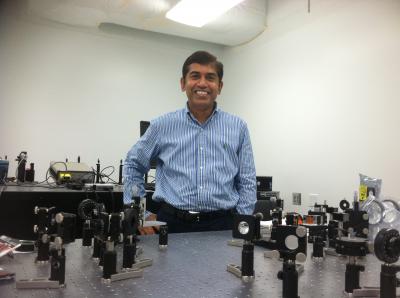Assistant Professor Jayan Thomas from the University of Central Florida has synthesized a new nanomaterial which has the potential to safeguard sensitive equipment and pilots from destructive lasers.

Assistant Professor Jayan Thomas at UCF (Credit: UCF)
Thomas is studying the properties of gold nanoparticles when they are contracted further into a small-sized system known as nanoclusters. These nanoclusters can be considered to occupy the smaller end of the nanoscale while the bigger versions called nanocrystals occupy the bigger end of the nanoscale. Nanoclusters are only bigger than atoms. It is the result of such small dimensions that the normal tenets of physics that apply to particles perceptible by touch and smell are not applicable to nanoclusters.
Thomas states that the process of synthesizing atomically precise nanoclusters of metals is a demanding task. His team developed nanoclusters of gold by sequential addition of atoms. They found that such a synthesis yields nanoclusters with intriguing optical properties. By virtue of these characteristics, gold nanoclusters incorporated as material surfaces can diffuse high energy laser beams. The gold nanoclusters seem to be superior in this aspect vis-à-vis the bigger gold nanocrystals employed in window paintings in churches.
Pilots use helmet shields or glasses to protect their eyes against harsh sunlight. Coating glasses or helmets with the gold nanoclusters developed by Thomas will diffuse the harsh beams of sunlight. Sensitive equipment employed for navigation can be safeguarded against enemy attacks with destructive lasers by applying the gold nanoclusters on their surface. Apart from these applications, Thomas is reviewing the use of the gold nanoclusters in polymers employed in 3D telepresence to increase its light sensitivity.
Disclaimer: The views expressed here are those of the author expressed in their private capacity and do not necessarily represent the views of AZoM.com Limited T/A AZoNetwork the owner and operator of this website. This disclaimer forms part of the Terms and conditions of use of this website.